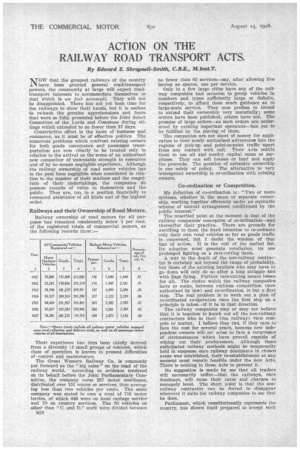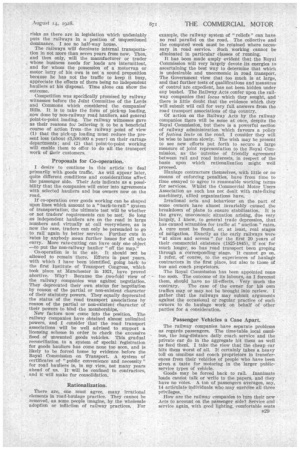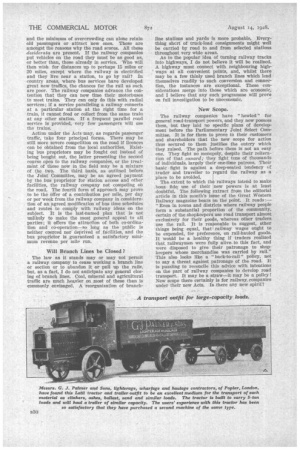ACTION ON THE RAILWAY ROAD TRANSPORT ACTS.
Page 54

Page 55

Page 56

If you've noticed an error in this article please click here to report it so we can fix it.
By Edward S. Shrapnell-Smith,
NTOW that the grouped railways of the country
have been granted general road-transport powers, the community at large will expect roadtransport interests to accommodate themselves to that which is un fait accompli. They will not be disappointed. There has not yet been time for the railways to show their hands, but it is useless to re-hash the genuine apprehensions and fears that were so fully presented before the Joint Select Committee of the Lords and Commons during sittings which extended to no fewer than 37 days.
Constructive effort is the basis ofbusiness and commerce, as it must be of effective politics. The numerous problems which confront existing owners for both goods conveyance and passenger transportation are now clearly to be treated only in relation to the arrival on the scene of an authorized new competitor of undeniable strength in resources and of by no means negligible experience. Although the railway ownership of road motor vehicles has in the past been negligible when considered in relation to the number of their stations and the magnitude of their undertakings, the companies do possess records of value to themselves and the public. They are, too, in a position financially to command assistance of all kinds and of the highest order.
Railways and their Ownership of Road Motors.
Railway ownership of road motors for all purposes has remained consistently below 1 per cent. of the registered totals of commercial motors, as the following records chow: Their experience has thus been chiefly derived from a diversity cf small groups of vehicles, which class of operation is known to present difficulties of control and maintenance.
The Great Western Railway Co. is commonly put forward as the "big noise" on the road of the railway world. According to evidence tendered on its behalf before the Joint Parliamentary Committee, the company owns 287 motor omnibuses, distributed over 151 routes or services, thus averaging less than two vehicles per route. The same company was stated to own a total of 719 motor lorries, of which 649 were on local cartage service and 70 on country services. The 70 vehicles on other than "C. and D." work were divided between
B28 no fewer than 65 services-say, after allowing five lorries as spares, one per service.
Only in a few large cities have any of the railway companies had occasion to group vehicles in numbers and types sufficiently large or definite, respectively, to afford them much guidance as to large-scale service. They now profess to intend to extend their ownership very materially; some orders have been published, others have not. The promise of large orders-as such orders are understood by existing important operators-has yet to be fulfilled by the placing of them.
The companies are not short of money for application to their newly authorized adventures into the regions of pick-up and point-to-point traffic apart from any contact with rail. Their Acts entitle them to use all and sundry capital sums or surpluses. They can sell houses or land and apply the proceeds. The question of extensive ownership is one solely of policy. The alternative to very widespread ownership is co-ordination with existing owners.
Co-ordination or Competition.
My definition of co-ordination is: "Two or more syStems, whether in the same or separate ownership, working together efficiently under an equitable scheme of mutual arrangement conditioned by the public interest."
The unsettled point at the moment is that of the railway companies' conception of co-ordination-and thereafter their practice. There are grounds for ascribing to them the fixed Intention to co-ordinate only their own road vehicles so far as goods traffic is concerned, but I doubt the wisdom of that line of action. It is the cult of the mailed fist. Its adoption must generate retaliation, its use prolonged fighting on a rate-cutting basis, A war to tile death of the non-railway contractor is certainly not beyond the range of probability, but those of the existing hauliers who may have to go down will only do so after a long struggle and with flags flying. Further rate-cutting means kisses for all. The choice which the railway companies have to make, between ruthless competition (now authorized by law) and co-ordination, is but a first step. The real problem is to work out ..a plan of co-ordinated co-operation once the first step as a principle is taken-if It be in that direction.
The railway companies may or may not believe that it is hopeless to knock out all the non-railway contractors who in their (the railway) view compete or matter. I believe they can, if they care to face the cost for several years, because new independent owners will no arise to face a recurrence of circumstances which have proved capable of wiping out their predecessors. Although these anticipated railway methods might be temporarily held in suspense once railway dominance in chosen areas was established, their re-establishment at any moment must remain feasible under the new Acts. There is nothing in those Acts to prevent it.
No suggestion is made by me that all traders will necessarily suffer-that the railways, once dominant, will raise their rates and charges to monopoly level. The short point is that the nonrailway contractor can be forced to disappear wherever it suits the railway companies to see that he does.
Parliament, which constitutionally represents the country, has shown itself prepared to accept such risks as there are in legislation which undeniably puts the railways in a position of unquestioned dominance. I see no half-way house.
The railways will dominate internal transportation in not more than seven years from now. Then, and then only, will the manufacturer or trader whose business needs for loads are intermittent, and for whom the possession of a motorvan or motor lorry of his own is not a sound proposition because he has not the traffic to keep it busy, appreciate the effects of there being no independent hauliers at his disposal. Time alone can show the outcome.
Competition was specifically promised by railway witnesses before the Joint Committee of the Lords and Commons which considered the companies' Bills. It is to take tbe form of pick-up loading, now done by non-railway road hauliers, and general point-to-point loading. The railway witnesses gave as their reasons for believing it to be a beneficial course of action from the railway point of view (1) that the pick-up loading must reduce the present loss (about £3,500,000 a year) on their cartage departments; and (2) that point-to-point working will enable them to offer to do all the transport work of their customers.
Proposals for Co-operation.
I desire to continue in this article to deal primarily with goods traffic. As will appear later, quite different conditions and considerations affect the passenger side. Their Acts indicate as a possibility that the companies will enter into agreements with selected hauliers and bus owners now on the road.
If co-operation over goods working can be shaped upon lines which amount to a "back-to-rail" system of transportation, the ultimate test will be whether or not traders' requirements can be met. So long as independent hauliers are on the road in large numbers and virtually at call everywhere, as is now the case, traders can only be persuaded to go to rail again by better service. Further cuts in rates by anybody mean further losses for all who carry. More rate-cutting can have only one object —to put the non-railway haulier "off the map." Co-operation is in the air. It should not be allowed to remain there. Efforts in past years, with which I have been identified, going Mack to the first Institute of Transport Congress, which took place at Manchester in 1921, have proved abortive. Why? Because the two-fold view of the railway companies was against negotiation. They deprecated their own status for negotiation by reason of the partial or non-existent character of their statutory powers. They equally deprecated the status of the road transport associations by reason of the partial or non-existent character of their powers to bind the memberships. New factors now come into the position. The railway companies have obtained almost unlimited powers, and I consider 'that the road transport associations will be well advised to support a licensing scheme in order to check the excessive flood of unwanted goods vehicles. This gradual reconciliation to a system of special registration for goods hauliers has come none too soon, and is likely to be forced home by evidence before the Royal Commission on Transport. A system of certificates of "public convenience and necessity" for road hauliers is, in my view, not many years ahead of us. It will be confined to contractors, and it will make for consolidation.
Rationalization.
There are, . one must agree, many irrational elements in road-haulage practice. They cannot be removed, as some people imagine, by the wholesale adoption or infliction of railway practices. For example, the railway system of "reliefs" can have no real parallel on the road. The collective and the computed week must be retained where necessary in road service. Such working cannot be eliminated in particular classes of running.
It has been made amply evident that the Royal Commission will very largely devote its energies to ascertaining the best way to determine that which is undesirable and uneconomic in road transport. The Government view that too much is at large, and that further tests of qualifications and measures of control are expedient, has not been hidden under any bushel. The Railway Acts confer upon the railway companies that /ocus which they sought, and
• there is little doubt that the evidence which they will submit will call for very full answers from the road transport associations of the country.
Of action on the Railway Acts by the railway companies there will be some at once, despite the Royal Commission, but there is a powerful section of railway administration which favours a policy of festina lente on the road. I consider they will be wise to hasten slowly. The wish may be present to see new efforts put forth to secure a large measure of joint representation to the Royal Commission, as the outcome of friendly agreement between rail and road interests, in respect of the basis upon which rationalization might well proceed.
Haulage contractors themselves, with little or no means of enforcing penalties, have from time to time essayed to agree to reasonable working terms for services. Whilst the Commercial Motor Users Association as such has not dealt with rate-fixing machinery, allied organizations have.
Irrational acts and behaviour on the part of some owners have almost invariably caused the breakdown of plans to ensure stabilization. It is the grave, uneconomic situation arising, due very largely, I know, to general trade depression, that has caused scrambles for traffic at " auction " rates. A cure must be found, or, at least, real stages of mitigation. Exactly as the early railways were "at sixes and sevens" for the first 20 years of their commercial existence (1825-1845), if not for much longer, so has road transport been groping through a corresponding stage. It cannot go on. I refer, of course, to the experiences of haulage contractors in the first place, but also to those of bus and coach proprietors.
The Royal Commission, has been appointed none too soon. The outcome of its labours, as I forecast them, should have no ill-effects. Very much the contrary. The case of the owner for his own traffics may or may, not be brought into review. I gather that the railways may submit arguments against the occasional or regular practice of such owners to do haulage work on behalf of other parties for a consideration.
Passenger Vehicles a Case Apart.
The railway companies have separate problems as regards passengers, The time-table local omnibus, the long-distance daily coach service and the private car do in the aggregate hit them as well as feed them. I take the view that the cheap car hits them worst of all. It certainly takes a heavy toll on omnibus and coach proprietors in transferences from their vehicles of people who have been given a taste for motoring in the larger publicservice types of vehicle.
Goods may be forced back to rail. Inanimate loads cannot talk or write to the papers, and they have no votes. A ton of passengers averages, say, 14 articulate Individuals who may exercise all three privileges. How are the railway companies to turn their new Acts to account on the passenger side? Service and service again, with good lighting, comfortable seats n29
and the minimum of overcrowding can alone retain old passengers or attract new ones. These are amongst the reasons why the road scores. All these desiderata are present. If the railway companies put vehicles an the road they must be as good as, or better than, those already in service. Who will then wish for distances up to perhaps 15 miles or 20 miles, except where the Tailway is electrified and they live near a station, to go by rail? In country areas, where bus services have developed great new traffics, the chances for the rail as such are poor. The railway companies advance the contention that they can now time their motorbuses to meet trains. They can only do this with radial services; if a service paralleling a railway connects at a particular station at the right time for a train, it cannot feed or collect from the same train at any other station. If a frequent parallel road service is provided, very few passengers will use the trains.
Action under the Acts may, as regards passenger traffic, take four principal forms. There may be still more severe competition on the road if licences can be obtained from the local authorities. Existing bus proprietors may be fought out instead of being bought out, the latter presenting the second course open to the railway companies, or the treatment of those now in the field may be a mixture of the two. The third basis, as outlined before the Joint Committee, may be an agreed payment by the bus proprietor for station access and other facilities, the railway company not competing on the road. The fourth form of approach may prove to be the offer of a contribution per mile, per day or per week from the railway company in consideration of an agreed modification of bus time schedules and routes to comply with railway ideas on the subject. It is the last-named plan that is not unlikely to make the most general appeal to all parties; it offers the attraction of both co-ordination and co-operation--so long as the public is neither coerced nor deprived of fficilities, and the bus proprietor is guaranteed a satisfactory minimum revenue per mile run.
Will Branch Lines be Closed ?
The law as it stands may or may not permit a railway company to cease working a branch line or section or to abandon it or pull up the rails, but, as a fact, I do not anticipate any general closing of branch lines. Coal, mineral and agricultural traffic are much heavier on temst of these than is commonly envisaged. A reorganization of branch
line stations and yards is more probable. Everything short of truck-load consignments might well be carried by road to and from selected stations throughout very wide areas.
As to the popular idea of turning railway tracks Into highways, I do not believe it will be realized. A highway must connect with neighbouring highways at all convenient points, and, whilst there may be a few thinly used branch lines which lend themselves readily to such conversion and connection, the instances are exceptional. These considerations merge into those which are economic, and I believe that any such programme will prove on full investigation to be uneconomic.
New Scope.
The railway companies have " howled " for general road-transport powers, and they now possess them, but they laid no specific plans of development before the Parliamentary Joint Select Committee. It is for them to prove to their customers and shareholders that the new scope for action thus secured to them justifies the outcry which they raised. The path before them is not an easy one. They fight no monopoly, despite their reiteration of that canard; they fight tens of thousands of individuals, largely their one-time patrons. Their basic -fight is against a deep-seated tendency (if trader and traveller to regard the railway as a . place to be avoided.
The extent to which th railways intend to make bona fide use of their new powers is at least doubtful. The following xtract from the editorial article in this month's isue of the Great Western Railway magazine bears n the point. It reads:— " Even in towns and di lets where railway people form a substantial prop rtion of the community, certain of the shopkeeper use road transport almost exclusively for their goos, whereas other traders use the rail. It is rea onable to suggest, other things being equal, that railway wages ought to be expended, for preference, on rail-hauled goods. It would be a healthy thing if traders realized that railwaymen were fully aliveto this fact, and were disposed to give their patronage to shopkeepers whose merchandise was carried by rail." This also looks like a "back-to-rail" policy, not to say a threat against patronage of the road. It is puzzling to reconcile this advice with intentions on the part of railway companies to develop road transport. It may be a straw—it may be a policy! New scope there certainly is for railway companies under their new Acts. Is there any new spirit?




















































































































